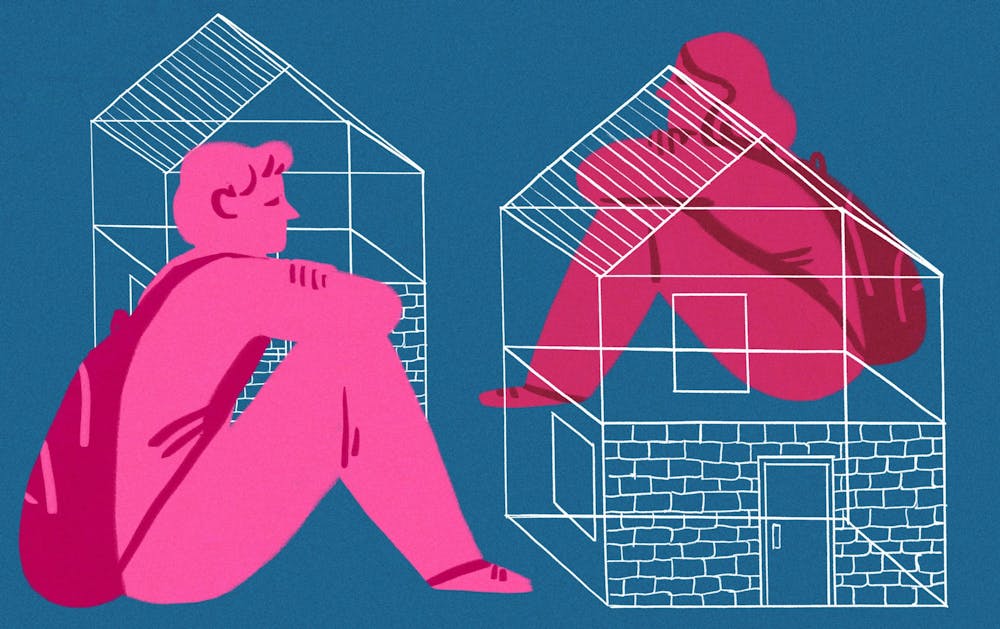No one wants to see homelessness.
It makes us nervous, uncomfortable, or sad. Maybe we feel guilt, pity, or judgmental for the mistakes we assume were made.
“I feel like you grow up guided to not look at these people when you walk past them, to not interact because strangers are dangerous,” said Sarah Hartley, a second-year law student at the Sandra Day O’Connor College of Law.
It’s an issue that is getting harder to ignore. Affordable housing is scarce, and it is impacting our peers. Misconceptions make it easy to be insensitive and hard to make changes. That lack of compassion leads to indifference, and we lose touch with our own humanity when we stop seeing people as human. At the very least we need to better understand this issue, and be more compassionate toward our unsheltered neighbors.
“Homelessness doesn’t pick a population – it can literally happen to anybody,” said Amy Schwabenlender, Executive Director of Human Services Campus. HSC is a 13-acre campus about a mile southwest of ASU’s Downtown Phoenix campus, where 16 nonprofit social service organizations provide temporary shelter and services for individuals experiencing homelessness.
At last count, there were over 9,000 people experiencing homelessness in Maricopa County, more than half without shelter. With increased inflation and housing costs, those numbers will likely continue to grow.
Nearly a quarter of people who are unhoused are under the age of 24. In fact, the number of 18 to 24-year-olds has increased by 41% in the past two years – the largest increase of any age group.
Many people who are working find themselves in unstable housing situations. According to Schwabenlender, 20 to 25% of people who come to HSC are employed. That’s not surprising, given that per RentCafe the average rent in Phoenix is almost $1,600 a month, and in Tempe, it’s $1,900.
“There are students who reach out and say, ‘I’m going to be homeless,’ or ‘I am homeless,’ and they want to keep going to school,” Schwabenlender said. “But they don’t know where they’re going to sleep at night.”
READ MORE: Opinion: ASU needs to focus on its housing crisis
Being without shelter creates stress and leaves people exposed to harsh conditions. The Guardian reported in July that as many as 500 homeless people died in Maricopa County in the first half of 2022, which is almost as many as the medical examiner reported in all of 2021. Schwabenlender said she often sees people prey on the HSC population, leading to theft, physical abuse and trafficking.
“People who are on the streets are much more likely to be a victim of crime than they are to commit a crime against somebody else,” said Shana Ellis, Executive Director of Action Nexus on Housing and Homelessness.
Action Nexus is a public service team within the Watts College of Public Service and Community Solutions at ASU, created with the help of Human Services Campus in 2020 to encourage collaboration among the different support systems in Maricopa County and to connect them with ASU resources to address the issue of homelessness.
Ellis said it will take time and money to change the system to meet the growing needs, but the most important element is the political will.
Students who notice the growing number of people who are unsheltered around campus too often choose to complain over compassion. Ellis said the important thing is that people are noticing.
“People are paying attention,” Ellis said. “That dialogue you’ve noticed really beginning to start on Reddit and (with) a lot of the students, that’s not necessarily a bad thing.”
Some dialogue can be harmful, though. For instance, Schwabenlender said political ads that tie homeless people to crime are misleading. Ads that use derogatory language and exploit this issue to instill fear and indifference may increase as we get closer to the November election.
“There’s nothing that’s the same about the 1,800 people in our neighborhood today,” Schwabenlender said, “other than the fact that they don’t have a place to live.”
If the political will is needed, then indifference makes things worse.
Hartley recently heard a classmate on campus casually describe herself as "looking homeless."
“Like what does that mean? To look like you don’t have a place to rest your head? What you mean to say is that you look dirty,” Hartley said, “or that you don’t like your clothes, or that you look unclean. But you don’t look homeless, because what does your housing situation have to do with the way you’re dressed right now?”
Hartley, who works with ASU's Homeless Legal Assistance Project, believes that mentality is reflected in city services, like budgets and policing. This can be seen in the allegations being investigated by the Department of Justice of excessive force and abuse of homeless people by Phoenix Police, or in the tragedy this summer when Tempe Police watched as a homeless man drowned.
“A week before, they saved a dog,” Hartley said.
We can do better. We’re not immune from circumstances that may lead to homelessness, and we should be sensitive to the reality that our peers may have unstable living situations.
In fiscal year 2021-22, the city of Tempe was able to accelerate its efforts to provide resources for those experiencing homelessness through its Homeless Outreach Prevention Effort by hiring more specialists. The team has nine dedicated certified behavioral health technicians who can put people experiencing homelessness in contact with mental health and medical care. The services also include an allocation of basic necessities and referrals to emergency shelters as well as support in navigating the path to secure housing. The HOPE team can be contacted at 480-350-8950.
Ambassadors with Downtown Phoenix Inc., a nonprofit organization that works to “promote the continued revitalization of downtown,” are available to help refer people in need to assistance programs for substance abuse treatment, housing, shelter, food, jobs and health care, according to the Downtown Phoenix Inc. website. Ambassadors wear orange shirts and are available seven days a week, every day of the year, the website says. For more information, you can call 602-495-1500.
If you are a student experiencing homelessness, you can contact the Dean of Students for your campus. There are resources and processes in place. ASU Police said in an email that visitors who are homeless can access public areas on campus, but if you see an individual who may need assistance you can reach out to ASU Police at 480-965-3456.
Editor's note: The illustration featured in this story was changed on Sept. 28 at 10 p.m. to better reflect the content of the piece. The story was updated on Sept. 28 at 11:15 p.m. to include a more comprehensive list of resources assisting people experiencing homelessness.
Edited by Sadie Buggle, Wyatt Myskow and Kristen Apolline Castillo.
Reach the columnist at jdbrow52@asu.edu and follow @jamesbrownasu on Twitter.
Editor's note: The opinions presented in this column are the author's and do not imply any endorsement from The State Press or its editors.
Want to join the conversation? Send an email to opiniondesk.statepress@gmail.com. Keep letters under 500 words and be sure to include your university affiliation. Anonymity will not be granted.
Like The State Press on Facebook and follow @statepress on Twitter.

James Doyle Brown, Jr. is an opinion columnist at The State Press. He is also in his final semester as a graduate student studying investigative journalism at the Walter Cronkite School of Journalism and Mass Communication. He has previously reported for the State Press politics desk, The Howard Center of Investigative Journalism and Carnegie-Knight News21.




